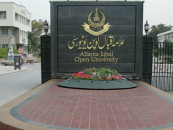Roundtable: HEC devolution should take place after an informed policy debate
Experts were discussing devolution and the future of the HEC, as part of Jinnah Institute’s Open Democracy Initiative.

Two years after the passage of 18th Amendment, the Higher Education Commission (HEC) is yet to be devolved. There is little clarity on the sequencing of its devolution to the provinces and how such a transition will be managed needs to be seen, concluded experts at a roundtable organised by Jinnah Institute (JI), said a press release.
They were discussing devolution and the future of the HEC, as part of Jinnah Institute’s Open Democracy Initiative.
HEC Executive Director Dr Sohail Naqvi said that the commission’s devolution needed to be planned carefully. He said the process involves a transfer of resources worth Rs48 billion and there were lessons that could be learnt from other countries where devolution had taken place. A high-powered cabinet committee was deliberating this issue and examining various options, he added.
Dr Pervez Hoodbhoy, a senior academic, said that there were many advantages of federally regulated higher education, such as overseas scholarships, digital libraries and economies of scale. He added that the existence of HEC was not disputed but how such a body functioned was the real question. Hoodbhoy remarked that the HEC model currently in place incentivised corruption, whereby mass production of poor quality research papers was a proof of an academic’s merit. The granting of university charters did not take into account the quality of research, teaching or learning, he added.
Responding to Dr Hoodbhoy, Dr Naqvi observed that HEC has been able to improve the amount of research being done in Pakistan, and about 6,200 research papers have been published in international journals recently.
In addition, greater numbers of Pakistani graduates are admitted to top ranking foreign universities. He felt that in the event of a complete dissolution of the HEC, there will be no alternate mechanism to provide deserving students chances to study abroad.
Civil society activist Tahira Abdullah said HEC’s devolution must not be implemented in haste. At the same time, she added, HEC’s current way of functioning is untenable and the standard of research and fieldwork in higher education institutions are disappointing.
Zafarullah Khan of Centre for Civic Education said that quality standards of higher education cannot be ignored, but a proper federal institutional framework must be agreed upon. He added that the provinces need to build capacity to manage a decentralised higher education system.
Masood Kizilbash, adviser UNDP, said that the Supreme Court ruled that the federal government administers all policy aspects of higher education in Pakistan.
Marvi Sirmed, the moderator, concluded the discussions saying that HEC devolution required more public input into the policy process.
Published in The Express Tribune, April 21st, 2012.



















COMMENTS
Comments are moderated and generally will be posted if they are on-topic and not abusive.
For more information, please see our Comments FAQ